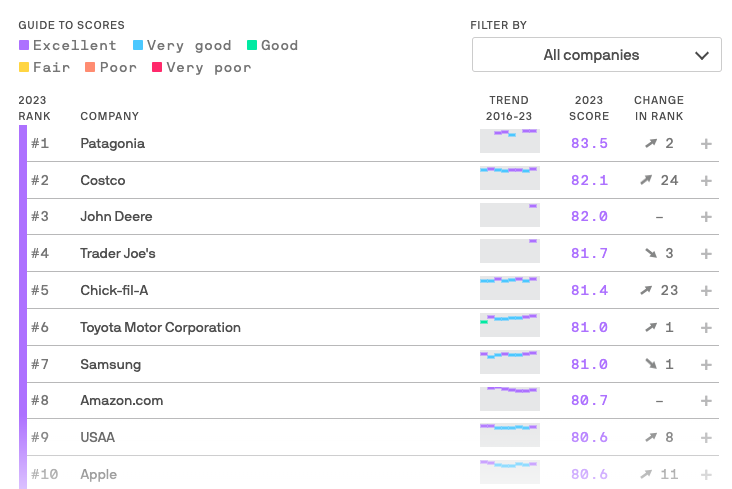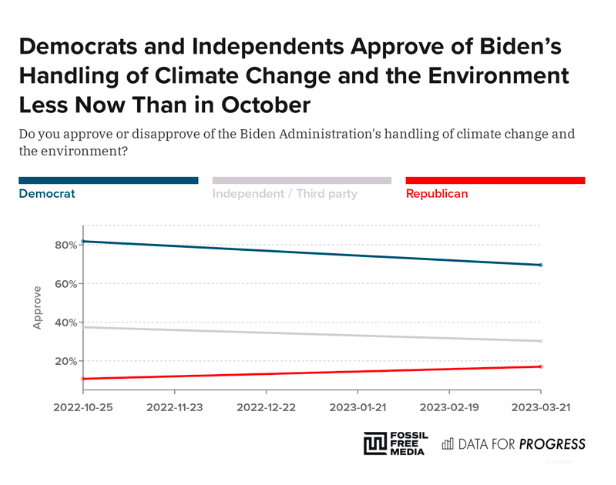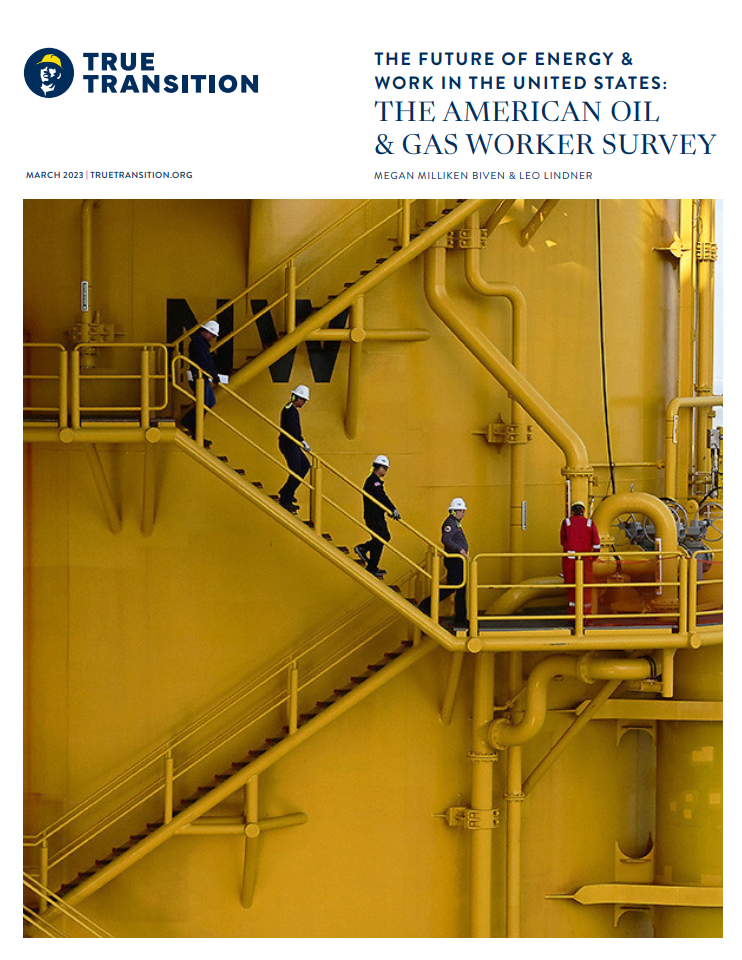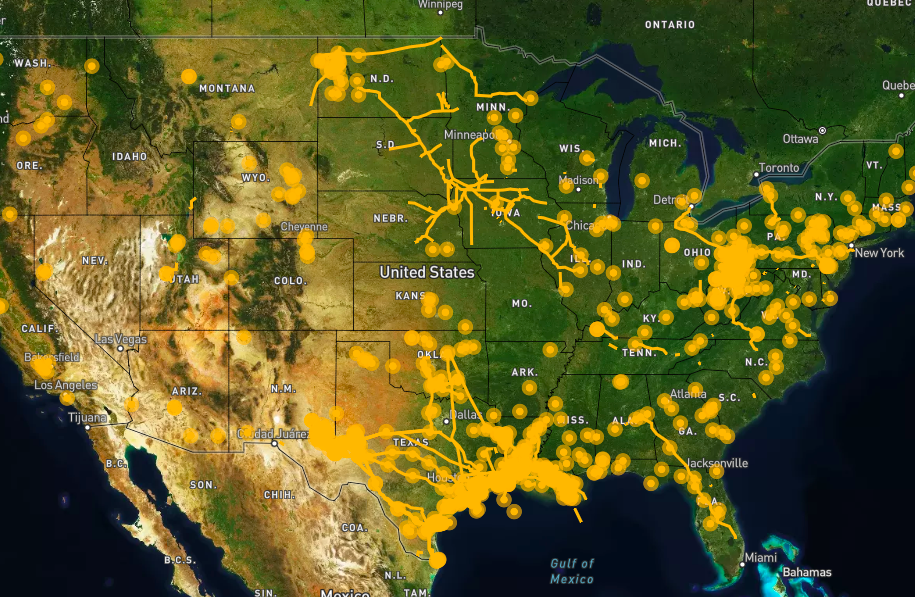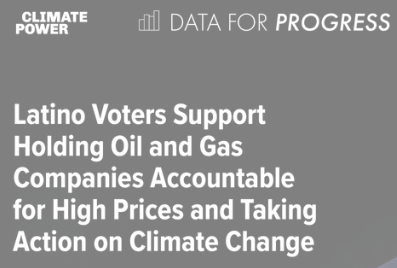Resources
Search below for resources covering the intersection of climate engagement, social science and data analytics.
RESULTS
Patagonia tops the list of the country’s most respected brands. Fossil fuel companies - especially ExxonMobil and BP - fare poorly. Patagonia scored 83.5, an “excellent” score. Exxon was 82nd on the list, scoring 68.9, a “fair” score. BP was 92nd, scoring 63.5, a “poor” score.
Poll: Voters Do Not Want New Fossil Fuel Projects Prioritized on Public Lands
President Biden’s ratings on climate and the environment have slipped in recent months among Democrats and young voters. News about the Willow project drops his ratings among Democrats further, as voters - especially Democrats - don’t want to prioritize fossil fuel projects on public lands. By a 56%-35% margin, voters say that the federal government should prioritize clean energy projects over fossil fuel projects when allowing new energy projects on public lands. By an 80%-12% margin, voters support President Biden’s original campaign promise to take action against polluters who knowingly harm the environment or conceal information regarding health risks. By a 57%-32% margin, voters support President Biden’s original campaign promise to ensure a 100% clean energy power sector by no later than 2035.
The Future of Energy & Work in the United States: The American Oil & Gas Worker Survey
Cross sectional survey of 1,635 non-management oil and gas workers in the US revealed new insights and key themes relevant to a truly "just transition" from fossil fuels, including:
How to beat the ‘fracking frenzy’ — lessons from the campaign that ended fracking in Ireland
The successful Irish anti-fracking struggle offers key insights on community power building for anti-extraction movements all over the world. In 2017, community activists in Ireland mobilized a grassroots movement that forced the state to revoke fracking company Tamboran’s license and ban fracking. The first step towards defeating Tamboran in Ireland was building a movement rooted in the local community. Out of this experience, five key “rooting strategies” for local organizing emerged — showing how the resistance developed a strong social license and built community power. First, build from and on relationships. Second, foster ‘two-way’ community engagement. Third, celebrate community. Fourth, connect to culture. Fifth, build networks of solidarity. Four key political strategies include: find strategic framings; demonstrate resistance; engage politicians before regulators; focus on the parliament.
From divergence to convergence: Examining the energy transition expectations of oil and gas executives and investors
Amid a growing focus on net-zero, a recent Deloitte survey compares the expectations of oil and gas (O&G) executives and institutional investors around the energy transition. O&G companies cite a 28% average reduction in emissions over the last three years and remain confident about achieving a 50%–60% reduction in emissions by 2030. Additionally, there is a recognition that the O&G industry offers high dividend and buyback yield to investors, leading all industries with a combined yield of 8% in 2022. Although their paths toward net-zero might not be completely aligned, there seems to be a shared consensus between executives and investors on the industry’s potential to achieve its overarching goal.
Oil & Gas Watch Database
The interactive map below shows the locations of proposed new and expanding oil, gas, and petrochemical infrastructure projects that were approved or announced since 2012. 457 of these projects have been built over the last decade and are permitted to release up to 136,780,765 tons of greenhouse gases per year. An additional 538 projects have not yet been constructed, but have the potential to release an additional 205,341,832 tons of greenhouse gases per year.
Voters Say Lawmakers Should Listen to Communities Over Fossil Fuel Interests
Environmental advocates can strengthen their argument on permitting reform by framing it as an issue of communities vs. corporate interests. Voters overwhelmingly believe that input from impacted communities should be prioritized over input from industry association groups as Congress considers changes to the permitting process for energy projects. Voters support the Environmental Justice for All Act by a greater than three-to-one margin (69% support / 20% oppose) after reading a brief description of it. By a 65%-22% margin, voters prefer that lawmakers prioritize feedback from impacted communities over industry association groups like the American Petroleum Institute when considering changes to the permitting process. By a 56%-35% margin, voters say that President Biden should prioritize permitting for clean energy projects over fossil fuel projects. Just 16% of voters believe that permitting reform should be attached to the annual government spending bill, compared to 59% who say it should be considered as a standalone bill and 10% who say it shouldn’t be considered at all.
Time to Put the Fossil-Fuel Industry Into Hospice
If humanity is to survive the climate crisis, we must manage a just and orderly transition away from fossil fuels. Acknowledge the full scope of the problem. Recognize the limited scope of economic policy solutions. Accept that substantially reducing greenhouse-gas emissions presents an existential challenge for the industry. We face the challenge of managing “compassionate destruction,” in which we guide all the complex and expansive elements of the fossil-fuel sector through a just and orderly transition to a carbon-free economy. Bring about the end of the entire sector through corporate collaboration. Protect workers and avoid labor flight during transition. Overcome political and social resistance to change. Account for the full scope of the financial impact of the transition. Control the fate of products both used and unused. Protect indirect workers in related industries. Maintain justice and equity for all communities. Decommission, remediate, and repurpose dedicated infrastructure. Leverage the power of government. Overhaul business education as if people and the planet really matter.
New Mexico voters widely support proposals to shift the state toward clean energy, reduce methane pollution, and protect safe drinking water. 89% of New Mexico voters support a proposal to provide funding to help rural and tribal communities repair systems that ensure safe drinking water. 70% of New Mexico voters support the state’s new requirements for the oil and gas industry to use technologies that limit methane emissions and other pollution. 58% of New Mexico voters support proposed state legislation that would make New Mexico a national leader in clean energy production and require that the state cut climate pollution by half by 2030 and reach net-zero by 2050.
Poll: Latino Voters Support Holding Oil and Gas Companies Accountable for High Prices and Taking Action on Climate Change
Latino voters are widely supportive of the clean energy transition and see it as an economic positive. Amid the energy crisis, most Latino voters blame oil and gas companies for high gas prices and want to see these companies held accountable. The poll finds that climate change is a major worry for Latino voters: nearly half of Latino voters nationwide (47%) say they are “very concerned” about climate change, including just over half of Latino voters in Florida (51%) and Nevada (51%). Climate Power and Data for Progress also find that, amid the current energy crisis, Latino voters are more likely to blame oil and gas companies for higher energy prices than any other actor. The majority (55%) say that oil and gas companies deserve “a great deal” of blame for higher prices, while 40% blame Vladimir Putin a “great deal” and 36% blame President Biden “a great deal.” And consistent with the blame they put on fossil fuel companies for higher energy prices, there is widespread support among Latino voters for a tax on the excess profits of oil and gas companies (73% support / 21% oppose, with 47% “strongly” supporting the idea).
Pagination
- Previous page
- Page 2
- Next page
